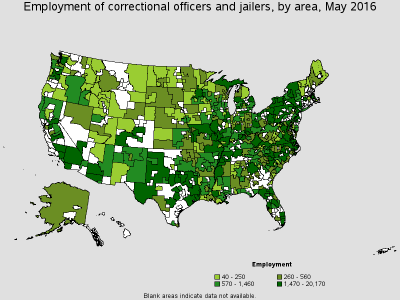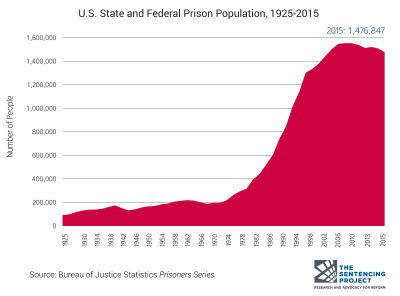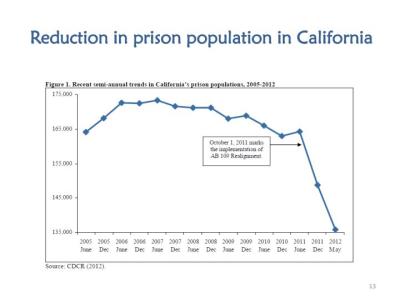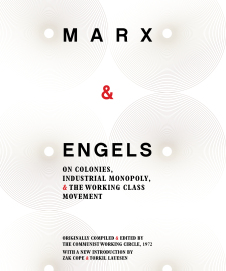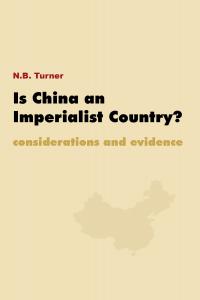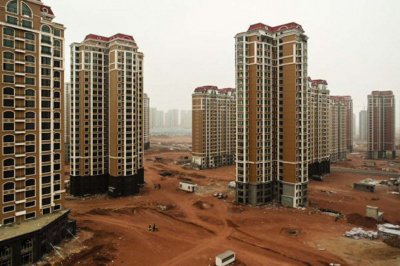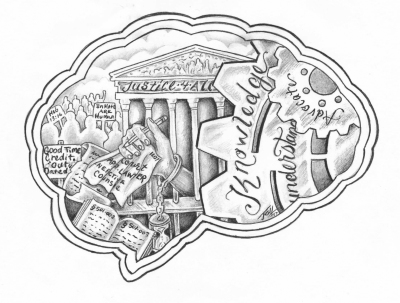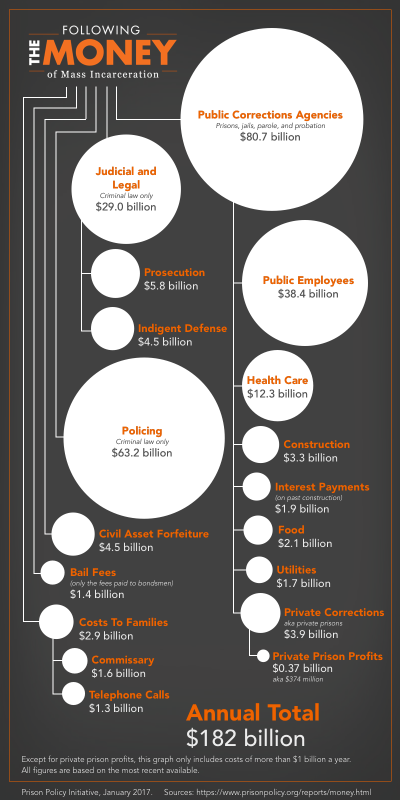
Book Review: Locked In
Locked In: the true causes of mass incarceration - and how to
achieve real reform
by John F. Pfaff
2017 Basic
Books
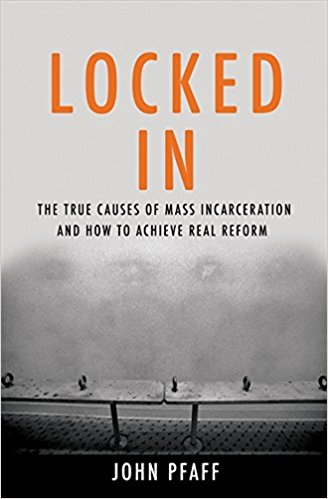
With over 2 million people behind bars, Amerikkka locks up more people per capita than any other nation in the world. But within this system of mass imprisonment there is an even more striking story of national oppression: New Afrikans locked up at 5 times the rate of whites, and Chican@s and First Nations also locked up at disproportionately high rates. We might hope that a book about the true causes of mass incarceration (and how to achieve real reform!) would address this discrepancy. But Pfaff, like all good bourgeois scholars, is focused on how to make capitalism work better. And so ey sweeps this whole issue under the rug in a book that offers some really good science and statistics on imprisonment. Here we will pull out the useful facts and frame them in a revolutionary context.
Overall Locked In does a good job of exposing some important facts and statistics often ignored by prison researchers. Pfaff attacks what ey calls the “Standard Story.” This is the name ey gives to the common arguments anti-prison activists make, which ey believes are counter-productive to their (and eir own) goals of prison reform. Ey claims these arguments either over simplify, or are straight up wrong, about why we have so many prisoners in the United $tates, and as a result target the wrong solutions.
The big picture
Pfaff sometimes gets lost in the details and fails to look at the big picture. For instance, ey argues that “we are a nation of either 50 or 3,144 distinct criminal justice systems” talking about the big differences in how each state and even each county deals with prosecution, sentencing and prisons.(p. 16) While it is true there are significant differences, this thinking evades the importance of looking at the big picture that it’s no coincidence that so many distinct counties/states have such high rates of imprisonment in this country. It’s a good idea to examine state and county level differences, and learn lessons from this. But using this information in the interests of the oppressed requires an understanding of the underlying role of the Amerikkkan criminal injustice system in social control and national oppression, the topic Pfaff studiously avoids.
In one of eir rare references to the role that nation plays in the criminal injustice system in the United $tates, Pfaff bemoans that “Obviously, effecting ‘cultural change’ is a very difficult task.”(p. 228) Ey entirely misses the fundamental national oppression going on in this country. To him it’s just about attitudes and cultural change.
Pfaff does raise some good big picture questions that scientific capitalists and communists alike need to consider. Discussing the importance of balancing the cost of crime against the costs of enforcement Pfaff asks “what the optimal level of crime should be.” “Why is crime control inherently more important than education or medical research or public health?” “What if a reduction in prison populations would allow 100,000 children with at least one parent in prison to now have both parents at home, but at a cost of a 5 percent rise in aggravated assaults (or even some number of additional murders) – is this a fair tradeoff, even assuming no other criminal justice benefits (like lower future offending rates among these children)?” But Pfaff notes that politicians in the United $tates are not able to talk about these things. Even Bernie Sanders’s discussion of investing more in schools and less in prisons was in the context of reducing crime more efficiently. It’s just not okay to say education should be prioritized over crime control.(p. 119) And so Pfaff concludes that we must work on reforms that can be implemented within this severely restricted political system. We see this as evidence that the system will never allow significant change.
Another place where Pfaff frames the larger context in useful and scientific ways is around the question of why people commit crimes. While ey dances around the social causes of crime, Pfaff offers some good analysis about how people age out of crime. And this analysis leads to eir position that we shouldn’t be calling people “violent offenders” but instead just saying they have committed violent crimes. Data shows that most people commit crimes when young, and as they age they are far less likely to do so again.Crime rates and imprisonment rates
Pfaff is a professor of law at Fordham University, and like people working within the capitalist system ey accepts the capitalist definitions of crime. This means ey ignores the biggest criminals: those conducting wars of aggression and plunder against other nations in the interests of profit. For the purposes of this review we will use the term crime as Pfaff does in eir book, to refer to bourgeois-defined crime.
Crime rates in the U.$. grew in the 1970s and early 1980s. Pfaff believes that “rising incarceration helped stem the rise in crime.”(p. 10) Disappointingly ey doesn’t put much work in to proving this thesis. But at least ey concedes that locking up more people may not have been the best response to rising crime.(p. 10) And ey goes on to note that crime rates continued to fall while prison populations also fell in later years: “Between 2010 and 2014, state prison populations dropped by 4 percent while crime rates declined by 10 percent – with crime falling in almost every state that scaled back incarceration.”(p. 12) So even if locking up people in the 70s and 80s did curtail some crime, clearly there isn’t a direct correlation between imprisonment rates and crime rates.
There was a drop in the number of prisoners in the United $tates between 2010 and 2014 (4%), but this was driven by California which made up 62% of the national decline. Outside of California, total prison populations fell by 1.9% during this same period. But at the same time total admissions rose by 1.1%. Pfaff cites this statistic in particular to point out a failure of prison reform efforts using the metric of total prison population. If the goal is to reduce the prison population overall, looking at the drop in people locked up will miss the fact that the total number of prisoners is actually rising!(p. 69) This is an important point as we know that prison has lasting effects on all who are locked up, as well as on their community, even if they are only serving short sentences.
War on Drugs is not driving prison growth
Disagreeing with the common argument that locking up low-level drug offenders is driving up the prison population, Pfaff points out that “only about 16 percent of state prisoners are serving time on drug charges – and very few of them, perhaps only around 5 or 6 percent of that group, are both low level and nonviolent. At the same time, more than half of all people in state prisons have been convicted of a violent crime.”(p. 5) So ey argues that targeting non-violent drug offenders is focusing on too small a population to make a significant impact.
Pfaff offers extensive data analysis to demonstrate that the number of people serving time for drug convictions just aren’t enough to be a major driver of state prison growth. Ey does concede that “the single biggest driver of the decline in prison populations since 2010 has been the decrease in the number of people in prison for drug crimes. But focusing on drugs will only work in the short run. That it is working now is certainly something to celebrate. But even setting every drug offender free would cut our prison population by only 16 percent.”(p. 35)
From this analysis Pfaff concludes that it is essential that prison reformers not avoid talking about violent crime. “From 1990 to 2009… about 60 percent of all additional inmates had been convicted of a violent offense.”(p. 187) “[T]here are almost as many people in prison today just for murder and manslaughter as the total state prison population in 1974: about 188,000 for murder or manslaughter today, versus a total of 196,000 prisoners overall in 1974.”(p. 185) And due to length of sentence, “Violent offenders take up a majority of all prison beds, even if they do not represent a majority of all admissions.”(p. 188) So those serious about cutting back prisons will need to cut back on locking people up for violent crimes.
Length of sentence
Pfaff concludes that longer sentences are not the cause of rising imprisonment rates. This is the opposite of the common anti-prison activist position: “despite the nearly automatic assumption by so many that prison growth is due to ever-longer sentences, the main driver of growth, at least recently, has been steadily rising admissions for fairly short terms.”(p. 74) “[M]ost people serve short stints in prison, on the order of one to three years, and there’s not a lot of evidence that the amount of time spent in prison has changed that much – not just over the 1990s, 2000s, and 2010s, but quite possibly over almost the entire prison boom.”(p. 6)
Pfaff does concede that official sentences, per statutes, have gotten longer, but ey claims time served has changed much less. At most average time served in state prisons increased by 36% between 1990 and 2009, which ey calls a small increase that can’t explain most of the prison growth over that time. (p. 58) Ey argues that tough sentencing laws are all about politics and legislator image, trying to look tough on crime. But they count on prosecutors not actually imposing the maximum punishments.
Private prisons vs public employees
We agree with Pfaff that private prisons don’t play a very large role in the current Amerikan criminal injustice system. “Private spending and private lobbying … are not the real financial and political engines behind prison growth. Public revenue and public-sector union lobbying are far more important.”(p. 7) And ey correctly identifies “the real political powers behind prison growth are the public officials who benefit from large prisons: the politicians in districts with prisons, along with the prison guards who staff them and the public-sector unions who represent the guards.”(p. 7)
Pfaff makes a compelling point: public prisons will act the same way private prisons act when facing the same contractual incentives. Ey goes on to argue that it might actually be better to expand private prisons but give them incentives for better performance, such as rewarding lack of recidivism.
It is public prison employees who are the strongest opponents of private prisons. This was seen in Florida where an attempt to privatize 27 prisons was killed after the public employees’ union got a bunch of congresspeople to vote against the bill.(p. 87)
This strength of public prisons lobbying is also behind the fact that closing public prisons doesn’t necessarily result in much savings because the unions will aggressively oppose any lost jobs. In Pennsylvania, the state closed two prisons in 2013 and laid off only three guards. In New York the prison population dropped by 25% since 1999 but they have not closed any prisons.(p. 88)
Pfaff concludes: “In other words, reformers should not really be concerned with the privateness of the PIC. They should worry that as prisons grow, the supporting bureaucracies – private and public alike – will grow as well, and they will fight against anything that jeopardizes their power and pay.”(p. 91)
Pfaff is correct that private prisons are not driving incarceration rates. Actually, public employee wages are playing a much larger role. However, there are valid reasons to oppose privatization for reformers, or anyone who subscribes to a sense of humynism. In our bourgeois democracy, the law does provide for greater accountability of public institutions. Therefore, public prisons will generally allow less unnecessary suffering than private ones. Of course, neither privatization, nor the public sector can eliminate the oppression of the capitalist state that is meted out by the police and prisons. Yet, privatization of the state-sanctioned use of force only creates more problems for those working for progressive change.
Recidivism
Pfaff disagrees with the argument that a big driver behind the prison population is recidivism, specifically that lots of people are being sent back to prison for technical violations or small issues. Ey does find that in most states the number of parole conditions has gone up, from an average of 11 in 1982 to an average of 18 in 2008.(p. 62) But digging into recidivism more deeply, Pfaff cites a study that found that only about a third of people admitted to prison end up returning. And ey correctly notes that if the commonly cited Bureau of Justice Statistics claim of a 50% recidivism rate is wrong, this just means that even more people are ending up in prisons at some time in their lives. This is perhaps an even scarier story than the high recidivism rate because it means that even more lives are being ruined by prison.
States vs counties
Pfaff points out that the $50 billion that states spend on prisons is only about 3% of state spending. And as has been seen in examples above, the savings from decarceration are not that great if states can’t actually close prisons or lay off guards. Also, releasing individual prisoners doesn’t result in much savings because prisons work on an economy of scale. While we can calculate the average cost of incarceration per persyn, we can’t translate that directly into savings when one persyn is released, because the entire infrastructure is still in place.(p. 99)
New York City actually did cut its prison population recently, along with a few other urban counties in New York. However, rural counties sent more people to prison so the overall impact was growth, not decreasing numbers of prisoners in New York.(p. 76) Similarly, higher crime rate areas like Los Angeles and San Francisco in California send relatively fewer people to prison compared to more rural counties which tend to be more conservative.(p. 77)
We touched on this urban vs. rural discrepancy in imprisonment rates in a recent article on national oppression in prison, suggesting that this could be the primary driver behind the (temporary?) drop in the discrepancy between incarceration rates of oppressed nations and whites. Since more whites are in the rural counties, statistically that’s who is getting locked up if those counties are locking people up at a higher rate. Pfaff’s data backs up our theory.
Prosecutors driving imprisonment
Pfaff argues compellingly that the primary driver behind the boom in prisoners in the past few decades is prosecutorial toughness: prosecutors are charging more people with more serious crimes. Prosecutors have a tremendous amount of latitude. They can determine the charges brought against people, which in turn drives the level of seriousness of the crime and potential sentences. They can also decide when to take a plea and what to offer in the plea.
To prove the impact of prosecutors, Pfaff cites data between 1991 and 2014 when crime rates were falling. During this period the arrest rates by police matched crime rates, which means that as violent and property crimes fell so did arrests for those offenses. In states Pfaff examined, arrests fell 10% between 1994 and 2008. But at the same time the number of felony cases rose steeply. Fewer people were entering the criminal injustice system but more were facing felony charges. Pfaff calculated a 40% increase in felony cases. Ey found this was the only thing that changed; felony charges resulted in imprisonment at the same rate as before. So Pfaff concludes: “In short, between 1994 and 2008, the number of people admitted to prison rose by about 40 percent, from 360,000 to 505,000, and almost all of that increase was due to prosecutors bringing more and more felony cases against a diminishing pool of arrestees.”(p. 72) The probability that a prosecutor would file felony charges against an arrestee basically doubled during this time period.
Pfaff attributes this prosecutorial aggression to a few things. First, the number of prosecutors trying cases has increased significantly over the past forty years, unrelated to crime rates. Prosecutor discretion is not new, but they seem to be using it more and more aggressively in recent years. And it is the prosecutors who have complete control over which cases get filed and which get dismissed. Prosecutors also have a huge advantage over public defenders, whose budget is significantly less than prosecutors and who don’t benefit from free investigative services from law enforcement.(p. 137)
Overall Pfaff finds very little data available on prosecutors and so finds it impossible to come to firm conclusions about why they are so aggressively increasing prosecution rates. Ey spends a lot of the book talking about potential prosecutoral reforms but also concludes that mandatory data collection around prosecution is essential to get a better handle on what’s going on.
While this data on the role of prosecutors in driving imprisonment rates in recent years is interesting, revolutionaries have to ask how important this is to our understanding of the system. Whether it’s more cops on the streets driving more arrests, or more aggressive prosecutors driving more sentences, the net result is the same. If we’re looking to reform the system, Pfaff’s data is critical to effectively targeting the most important part of the system. But for revolutionaries this information is most useful in exposing the injustice behind the curtain of the system. We want to know how it works but ultimately we know we need to dismantle the whole system to effect real and lasting change.
Solutions
Even within eir general belief that prisons are necessary to stop crime, Pfaff makes some good points: “To argue that prison growth contributed to 25 percent of the drop in crime does not mean that it was an efficient use of resources: perhaps we could have achieved an equally large decline in a way that was less fiscally and socially costly.”(p. 116) And ey goes on to note that studies suggest rehabilitation programs outside of prison do a much better job reducing crime.
Some of Pfaff’s solutions are things we can get behind, like adequately funding public defenders. And most of them, if effective, would result in fewer prisoners and better programs to help prisoners both while locked up and once on the streets. But still these solutions are about relatively small reforms: giving prosecutors more guidance, expanding political oversight, expanding parole and providing more scientific structure to parole decisions, appointing prosecutors rather than electing them, setting up better contracts with private prisons paying based on how prisoners performed upon release.
All of these reforms make sense if you believe the Amerikan prison system has a primary goal of keeping society safe and reforming criminals. This is where we deviate from Pfaff because we can see that prisons are just a tool of a fundamentally corrupt system. And so reforms will only be implemented with sufficient belief from those in charge that the fundamental system won’t be threatened. And certainly the Amerikan imperialists aren’t looking to “improve” or reform the system; they will only react to significant social pressure, and only as much as they need to to take pressure off.
Related Articles:This article referenced in:








